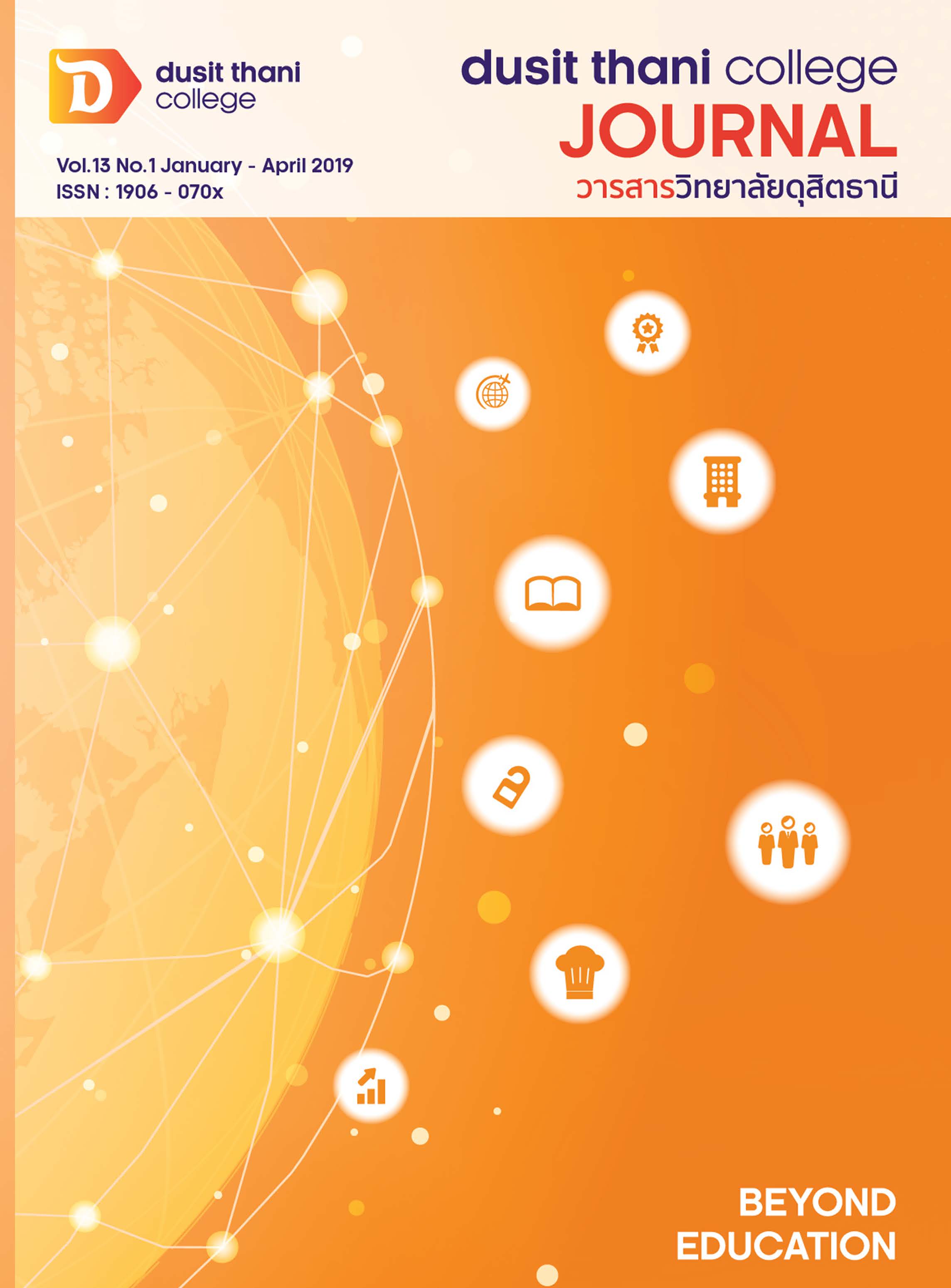Service Recovery Strategies for Satisfaction in Thai Tourists Experiencing Service Failures Caused by Hostels
Main Article Content
Abstract
This research aimed 1) to study experience of Thai tourists about service failures in hostel services and 2) to analyze the effective of service recovery strategies for satisfaction in hostel services. Research methodology used quantitative and qualitative research. The questionnaires were used for data collection taken from the sample 385 of Thai tourists who used to use hostel services. The in-depth interviews with 5 hostel entrepreneurs and 5 tourists who used to use hostel services. The data analysis including were frequency, percentage, standard deviation, comparing the differences with Paired-sample t-test at the statistical significance level at 0.01 and content analysis. The result of the study shows that the sample used to experience the most common in service delivery at 92.73%, staff services at 83.38% and customers’requests at 83.12% respectively. Level of satisfaction after use service recovery strategies is higher than level of satisfaction before use service recovery strategies at the statistical significance level at 0.01. The comparison of satisfaction after using the strategies revealed that problem-solving skill of staff was in higher relative level of satisfaction at 50.63% followed by discount or refund at 48.32%, promptly dealing with complaints at 38.54% and saying apology at 30.02%.
Article Details
Article Screening Policy
- All research and academic articles to be published must be considered and screened by three peer reviews in the relevant field / article.
- All articles, texts, illustrations and tables published in the journal are the personal opinions of the authors. Editors don't always have to agree. And no responsibility whatsoever is the sole responsibility of the author.
- The articles to be published must never be published. Where did you first publish? And not in the consideration of other journals If the audit found that there has been a duplicate publication It is the sole responsibility of the author.
- Any article that the reader sees as being plagiarized or impersonated without reference. Or mislead the work of the author Please let the journal editor know it will be your greatest blessing.
References
2. Prachachat. (2018). Travel Trends 2018 Drive World’s Economy. (Online). www.prachachat.net/world-news/news-95925, 4 January 2018. (in Thai)
3. Manager Online. (2016). Hostel boom 2016 penetrate in low cost market. (Online) . www.manager.co.th/iBizChannel, 20 September 2017. (in Thai)
4. Posttoday. (2017). Hostel for Millenium. (Online). www.posttoday.com/market,
20 September 2017. (in Thai)
5. Supalak Suriya. (2013). Guidelines for Service Quality Development of Hotel’s Front Office Department to support Asian Tourists: A Study of Boutique Hotels in Bangkok.Thesis, Degree Master of Arts (Tourism Management), National Institute of Development Administration. (in Thai)
6. Bateson, J. E. G. and K. D. Hoffman. (2008). Services Marketing. 4th ed. Mason: South-Western.
7. Bitner, M. J. (2009). Services Marketing Integrating Customer Focus Across the Firm.
5th ed. Singapore: McGrew-Hill.
8. Hudson, S. (2009). Marketing for Tourism and Hospitality. 2nd ed. Calgary: Nelson College Indigenous.
9. Koc, E. (2017). Service Failures and Recovery in Tourism and Hospitality. CABI: Wallingford.
10. Liat, C. B., S. Mansori, G. C. Chuan, and B. C. Imrie. (2017). “Hotel service recovery and service quality: Influences of corporate image and generational differences in the relationship between customer satisfaction and loyalty.” Journal of Global Marketing 30: 42-51.
11. Ogbonna, C. O. and P. A. Igbojekwe. (2015). “Evaluation of service recovery strategies in some hotels in Lagos, Nigeria.” Indian Journal of Commerce & Management Studies 6: 57-63.
12. Ok, C. et al. (2004). The Effectiveness of Service Recovery and Its Role in Building Long- term Relationships with Customers in a Restaurant Setting. Doctor of Philosophy Thesis in Human Ecology, Kansas State University.
13. Sciarelli, M. et al. (2017). “Mediating service recovery satisfaction in the relationship between internet service recovery and customer loyalty.” International Journal of Business and Management 12 (10): 24-42.
14. Tschohl, J. (2016). Customer Service Recovery for Hotels by Service Quality Institute (Online). www.customer-service.com, May 10, 2016.
15. Wirtz, J. and C. Lovelock. (2016). Services Marketing People Technology Strategy. 8th ed. Singapore: World Scientific Publication.
16. Yunus, Y., S. Ishak and S. Rhouse. (2012). “Critical service incidents: Analyzing service failure and recovery in hotels, restaurants and transportation in Malaysia.”
Journal of International Business and Economics 5: 18-37.
17. Zeithaml, V. A. and M. J. Bitner. (2003). Services Marketing: Integrating Customer Focus across the Firm. 3rd ed. New York: Irwin McGraw-Hill.


